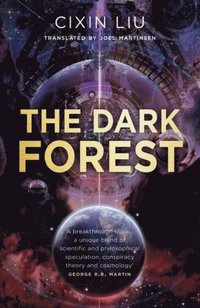
The Dark Forest by Cixin Liu does what a sequel must do: It continues the story. In this case, the previous book The Three-Body Problem ended with the Earth in a bad state where we have four centuries to prepare for the arrival of a hostile fleet of extra-terrestrials who has made sure that any new fundamental developments of human technology will fail. In The Dark Forest we see how Earth tackles this delicate issue.
Even though no new fundamental physics is possible, we humans can at least develop the present technology as far as possible, including the very practical hibernation technology allowing people to take some “time-outs” while waiting for the invasion. However, the extra-terrestrials (the tri-solarans) are able to eavesdrop on all human communication so it is a bit tricky for humans to develop any advanced strategies even within those boundary conditions. The solution is of course to develop strategies without communication. This is possible because the tri-solaran cannot read minds. This is the fundamental idea behind the Wallfacer Project: Four individual humans are given almost unlimited resources to use for whatever they want. They do not have to justify anything, just ask for whatever they need without explanations. Three of the Wallfacers are well known political and scientific figures, but the fourth one is an unknown and unambitios astronomer and sociologist. His name is Luo Ji, and he is the main character in the book.
There is quite a number of other characters that we also follow through The Dark Forest, and I think that they are the weakest point of the book. They are a bit too many and too similar to each other for my taste. I simply had difficulties keeping myself updated about who they all are (yes, I have some troubles remembering Chinese names) and which ones are active or hibernating at the different parts of the storyline. The book is full of interesting ideas but it feels a little tougher to read than the first one. The reason could be that the two books had different translators into English. In the end, the story comes to a relatively satisfying conclusion, although it felt a bit odd to have such a long text finished in such a rushed way. Or is it concluded? I guess I will see that in the third book in the series.